Politics
Tommy Robinson’s book went to No 1 on Amazon. This is what I learned from the reviews | Zoe Williams
It’s always tempting to self-soothe when the far right is on the march. Tommy Robinson’s new book, Manifesto: Free Speech, Real Democracy, Peaceful Disobedience, briefly topped Amazon’s bestseller chart last week – above Boris Johnson’s memoir, but also above Richard Osman, the fastest-selling hardback fiction author in British history, and Sally Rooney. Oh well, I thought. Maybe the book itself is not that bad? Maybe he’s turned over a new leaf?
It is that bad: I will not read it, because I will not buy it, because the day I put £24.99 or any fraction thereof into the pocket of Stephen Yaxley-Lennon is the day I’ve parted company with the material world. But here’s how it is described in the blurb: “For decades the political class have openly planned to replace the indigenous people of Europe and in Manifesto we focus on how they are doing this in the UK.”
This is the great replacement theory, the organising principle of white supremacists: it isn’t voguish any more to simply hint that white people are better. When you’re looking to get racism off the sofa and generate a bigotry with some observable output, you have to create the sense of an active threat. This is where you bring in grand conspiracies, where Muslims seek to overrun the Judeo-Christian order by first arriving and then breeding faster. It’s an unabashed and disgusting assertion, taking as its first principle that every baby isn’t as precious, as miraculous, as exquisite as the next.
So maybe Manifesto’s readers aren’t real readers? Isn’t this what dark money is for – setting up bot factories to disrupt democracies, and bulk-buying far-right trash to make it look more popular than it is? That might account for some of the sales, but there are enough real people to put real reviews on Amazon, and they’re all a variation on the same thing: “the truth is all coming out”; this is “the book the government do not want you to read”; “as long as there are people like Tommy, all is not lost”; “it unravels the web of lies we have been told for decades”.
There are some personal touches, such as “it will sit on my shelf alongside works of Churchill, De Gaulle, Enoch Powell, Tom Holland and Douglas Murray, to name but a few”. But generally speaking, it’s the same sentiment, in very similar words: politics is a lie and the modern world is an elite conspiracy, hellbent on silencing, impoverishing and ultimately vanquishing the Indigenous peoples of the west. How it would help this nefarious elite to engineer a clash of civilisations is a bit unclear. But the argument has moved beyond the point at which a careful critique of its internal logic would deflate its adherents.
Many argue that Amazon shouldn’t have stocked the book in the first place. It had no problem removing Robinson’s 2019 book, Mohammed’s Koran: Why Muslims Kill for Islam (co-written, like Manifesto, with Peter McLoughlin), on the grounds that its content was “inappropriate”. And Manifesto, after last week’s sales, is now unavailable, with the opaque message: “We don’t know when or if this item will be back in stock.” Amazon could have removed the book for its political outlook, or it could have run out of copies. Either way, Robinson’s supporters will take that as proof of one of their arguments: that they are being silenced by a liberal conspiracy, or they are much more numerous than the world cares to admit.
This question has been smouldering for years, igniting in a single event now and then – such as the appearance of Nick Griffin, then leader of the British National Party, on Question Time in 2009 – only to die back down, unresolved, unextinguished, and it is: what is society’s duty, with the storytelling of the far right? Does it have to be aired, in order that it can be fought? If it’s silenced, will it go away? Is it always better to know what bigots are thinking, rather than pretend they don’t exist?
The sheer length of this debate makes it feel familiar, but in fact this territory is not familiar. Having the great replacement theory at the top of the charts is a new world, where the argument about freedom of speech – whether it has to extend to hate speech, what hate speech means – is already over.
after newsletter promotion
Do you have an opinion on the issues raised in this article? If you would like to submit a response of up to 300 words by email to be considered for publication in our letters section, please click here.
Politics
Why the next Tory leader needs to go Cornish

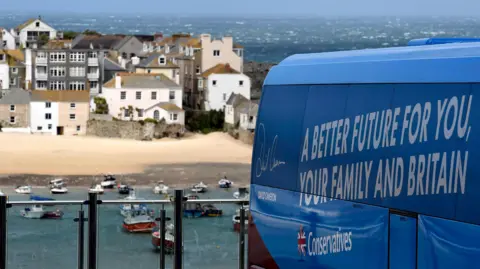 Getty Images
Getty ImagesNext Saturday we will finally find out who the Conservatives have chosen as their next party leader – and the leader of the UK government’s official opposition.
The two contenders, Kemi Badenoch and Robert Jenrick, are both seen as being on the right of the party, and their core messages, on immigration and cultural issues, seem designed to win back support from Nigel Farage’s Reform UK.
But the new leader will also need to do something about the votes the Tories lost to the Liberal Democrats and Labour in July’s general election, if they are going to restore their party’s battered fortunes.
Few parts of the country illustrate the challenge the new leader will face better than Cornwall.
The county used to be a sea of Conservative blue. Until recently, the party held all six Parliamentary seats.
But the tide turned in July’s election, and they were all washed away.
The Tories lost four seats to Labour and two to the Lib Dems, while Reform UK took votes across the board.
In the market town of Liskeard, which sits in a constituency the Tories lost to Labour, Richard Dorling chairs the South East Cornwall Conservative Association and spent time during the election knocking on doors and hearing voters’ concerns.
“They’re looking for people to take charge and reduce immigration and stop the boats, and Reform have a very strong story for that,” he said.
“Whoever gets into the leadership position is going to have to come up with a new plan to tackle that, and get the voters back.”
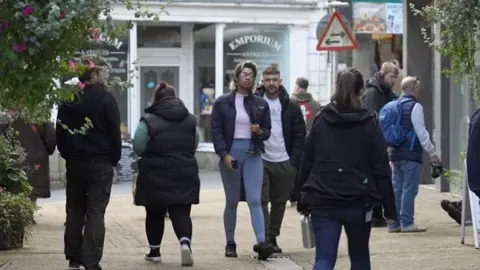
While some Tories argue addressing the concerns of voters attracted to Nigel Farage’s party is crucial, others have warned against tacking to the right to counter the threat posed by Reform UK, for fear it will permanently alienate more centrist former Conservative supporters who turned to Labour or the Lib Dems.
When Kemi Badenoch and Robert Jenrick became the final two candidates, it was widely seen as a signal the party would shift to the political right.
Connor Donnithorne, who stood for the Conservatives in Camborne & Redruth but lost to Labour, said focusing on the party’s position on the political spectrum was the wrong approach.
“You need to be in the common ground of British politics if you want to win,” he said. “That doesn’t mean you have to be in the centre, or the left or right.
“If we go down that path over the next five years, we’re not going to win again because you’re too focused on the internal politics of parties that the overwhelming majority of people in this country don’t actually care about.”

He argues that the party needs to focus on “common ground” issues such as “controlled immigration, lower taxes for working people, and supporting small businesses to create jobs”.
“It’s about having credibility, it’s about being in touch with what people want and it’s about delivering what say you say you’re going to deliver,” he adds.
It’s not just their fractured voting base the new Conservative leader will have to win round.
Kemi Badenoch or Robert Jenrick will have to unite a parliamentary party that’s been publicly arguing over its differences for years – and has been pretty adept at ousting leaders.
In reaching the final two, neither candidate won support from a majority of MPs, so whoever wins will do so knowing only around a third of the parliamentary party backed them.
Nick Craker, a Conservative councillor in Cornwall, said the leadership candidates need to focus on policies that unite the Conservatives rather than those that have the potential to divide them, including Robert Jenrick’s plan to leave the European Convention on Human Rights (ECHR) and “culture wars” confronted by Kemi Badenoch.
“The idea of leaving the ECHR, for example, makes me very nervous,” said Mr Craker.
“I just see that as a really divisive issue that’s going to cause infighting. I just think if you bring something like that forward, there’s going to be at least 50 MPs who are going to be very concerned about it.
“Similarly with some of Kemi’s ideas around gender and race and the culture wars, that makes me a bit nervous, because again she may have some really sound arguments to make on that, but there another 50 MPs at least that have probably got very different views to her and that’s going to just sow a bit more division and infighting.
“And what have we learnt from the last election? Divided parties don’t win.”

Badenoch and Jenrick are currently pitching to the party membership who are casting their ballots in this contest, but it will not be long before one of them will have to start pitching to the country.
In Cornwall, one message reflected by activists is the need for the party leadership to talk to grassroots members of the party who, they say, understand the issues in their communities.
Alison Hernandez, the Conservative Police and Crime Commissioner for Devon and Cornwall, said: “I think they’ve lost their way with being able to connect with members and activists in the party, and I think that needs to change – that connection.”
Of course, whoever leads the Conservative Party after 2 November will do so as a party of opposition – something neither Robert Jenrick or Kemi Badenoch have experienced as MPs.
That makes fighting for relevance harder when airtime and attention doesn’t come as easily.
Ms Hernandez added: “It feels like we’re invisible at the moment on the national stage, and it’s really important we’ve got someone who can embody the values of Conservatism and communicate that to the wider public.”
The Conservative Party is wrestling right now with what those values are, but the bigger question will ultimately be what the public makes of them.
Politics
‘We can’t change our history’ on slave trade, says Keir Starmer

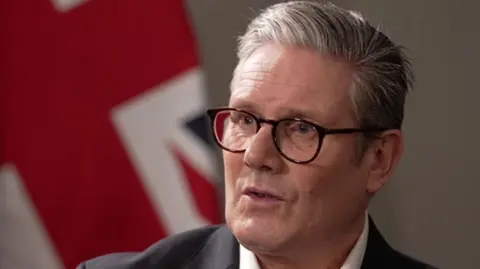 BBC
BBCThe UK “can’t change our history”, Prime Minister Sir Keir Starmer has told the BBC when asked about paying reparations to countries impacted by the transatlantic slave trade.
His comments come after diplomatic sources told the BBC that Commonwealth heads of government want to start a “meaningful conversation” about an issue that could mean the UK paying billions of pounds for its historical role in the trade.
Sir Keir, who is currently in Samoa for a meeting of Commonwealth countries, said the trade was “abhorrent” and that it was important to “talk about our history”.
Chancellor Rachel Reeves ruled out making payments, in an interview earlier on Thursday, saying “that’s not something that this government is doing”.
However, he added that the focus should be on “today’s challenges” including resilience in the face of climate change and boosting trade between Commonwealth nations.
He added he wanted to help member countries work with international financial institutions to “unlock money that might help them” in relation to climate change.
Leaders from 56 countries are attending the Commonwealth Heads of Government Meeting taking place in Samoa on Friday and Saturday.
Commonwealth leaders are expected to defy the UK and debate ways of securing reparations for historical slavery. At its height, Britain was the world’s biggest slave-trading nation. Downing Street has the issue is not on the agenda for the summit.
Reparatory justice for slavery can come in many forms, including financial reparations, debt relief, an official apology, educational programmes, building museums, economic support, and public health assistance.
In the run-up to the summit, there have been growing calls from Commonwealth leaders for the UK to apologise and make reparations.
King Charles will formally open the summit and is expected to use his opening speech to pay tribute to his mother the late Queen Elizabeth II and her connection to the Commonwealth.
He will also say the Commonwealth’s scale and diversity allows it to “discuss the most challenging issues with openness and respect”.
During the gathering, a new Commonwealth secretary general will be elected. All three of the candidates – Shirley Botchwey of Ghana, Joshua Setipa of Lesotho and Mamadou Tangara of Gambia – back reparatory justice.
Speaking to BBC Radio 4’s Today programme, Frederick Mitchell, the foreign minister of the Bahamas, said he believed the UK would change its stance, saying: “It may take a while for people to come around but come around they will.”
During the interview with the BBC, Sir Keir was also asked about a complaint Donald Trump’s team has filed against the Labour Party objecting to its staff and activists volunteering for Kamala Harris’s presidential campaign.
“I think this needs to be seen for what it is,” the prime minister said, adding: “It is some Labour Party members and staff in their free time campaigning.
“It’s happened in every election in different parts of the world. All political parties do it… I think it needs to be put in it’s proper perspective.”
Sir Keir added that both he and Trump wanted to have a “good working relationship” and that the pair recently had dinner together.
He dismissed suggestions that his party were still adjusting to being in government, saying he had “absolute clarity” on his “number one mission” of economic growth.
Next Wednesday Chancellor Rachel Reeves, will set out the government’s tax and spending plans in the Budget.
Ahead of this Reeves told the BBC she would be changing the government’s self-imposed debt rules to free up money for infrastructure spending.
Asked about the Budget, Sir Keir said the economy barely grew under the Conservatives and that he wanted to “clear the decks” and “clear up the mess”.
“I believe in running towards problems. If you know what the problem is, what the challenge is, every business knows this, every family knows it, run towards it and fix it.”
The Conservatives have challenged Labour’s argument that they created a £22bn black hole in the economy and questioned the chancellor’s decision to change the debt rules.
The party’s shadow Treasury minister Gareth Davies said “uncertainty over additional borrowing risks interest rates staying higher and for longer.
“It’s families up and down the country who would pay the price.”
Politics
What could reparatory justice for slavery look like?

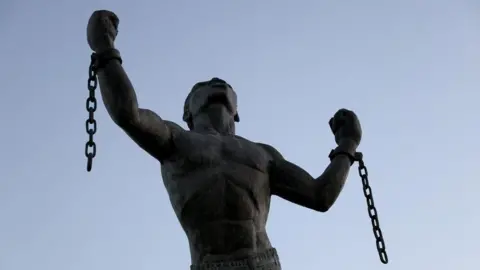 Getty Images
Getty ImagesCalls for the UK to provide reparations for its historic role in the slave trade have reignited ahead of a meeting of Commonwealth countries on Friday.
While Sir Keir Starmer said reparatory justice would not be on the agenda, Commonwealth leaders have defied the prime minister and plan to move towards a “meaningful conversation” on the issue.
The UK has long faced calls to provide reparations for its role in the Atlantic slave trade which saw millions of Africans enslaved and forced to work, largely on plantations in the Caribbean and Americas.
The chancellor told the BBC the UK would not be “paying out” reparations – but might there be other forms of reparations to consider, and how likely is it that the UK would commit to them?
Reparations are measures to make amends for past actions deemed wrong or unfair.
From 1500, the British government and the monarchy were prominent participants in the centuries-long slave trade, alongside other European nations.
Britain also had a key role in ending the trade, through Parliament’s passage of a law to abolish slavery in 1833.
As part of that law, British plantation owners were paid for the loss of their slaves, to the tune of some £20m.
The UK only finished paying off the debt it incurred to cover the payments in 2015.
Reparations for the benefit of those who suffered as result of slavery can take many forms, from financial to symbolic.
The United Nations says they must be “proportional to the gravity of the violations and the harm suffered”.
Here are some of the forms they can take.
Money
This is the most commonly understood form of reparatory justice – where a state gives money to a country whose communities it enslaved.
A 2023 report co-authored by a United Nations’ judge concluded that the UK owed more than £18tn to 14 countries in reparations.
The difficulty is that most European countries would struggle to find sums as astronomic as that.
The UK government, for example, spends a total of about £1.2tn every year.
Even if governments could find the money, it would be politically unpopular to spend so much on reparations and consequently less on schools and hospitals at home.
Some campaigners answer these points by saying reparations could be paid over time.
But many demands for straight cash payments are considered unfeasible by Western governments.
So for others, the debate about financial reparations often focuses instead on the question of debt relief.
Many developing countries which suffered from slavery owe large sums to Western countries.
The cancellation or reduction of that debt could lift a massive economic burden from a developing country at little political cost for a donor country.
Apology
On the face of it, this could appear relatively straightforward.
It does not cost anything, just a public act of atonement for past sins.
Some institutions – such as the Church of England – have apologised for links to slavery.
The difficulty, though, is that apologies can sometimes act as a declaration of legal responsibility for which there could be a financial cost.
Which is why states are often reluctant to take that step.
Earlier this week, former Prime Minister Tony Blair suggested it was wrong for states to apologise for historic wrongs – despite himself saying “sorry” in 2007.
“You can go back over history, and you end up in a completely absurd position”, he told Newsweek on Wednesday.
“The most important thing we can do for countries that have been marked by colonialism is to help them now.”
Few states that played a historic role in the slave trade have taken steps towards reparations.
Education
This includes educational institutions acknowledging their own connection to slavery and how they might have profited from the slave trade.
It can also involve teaching the history of slavery, as well as creating institutions for the study of slavery.
There are also calls for supporting schools to tackle low literacy levels and other issues that some argue date back to the slave trade.
Some campaigners say school exchanges and cultural tours would also be beneficial.
The countries pushing hardest for reparatory justice from the UK are in the Caribbean – and their collective organisation, known as Caricom, has its own reparations commission with 10 demands.
Three of these deal explicitly with education and culture, saying a “restoration of historical memory” was required.
Caricom said states involved in the slave trade had a responsibility to “build educational capacity and provide scholarships”.
Health
Some argue that reparatory justice should also include health – where European countries fund clinics and hospitals.
Medical evidence shows a high rate of type 2 diabetes in the Caribbean which some suggest is associated with centuries of poor nutrition due to past enslavement.
Historian Sir Hilary Beckles told the United Nations’s UN News earlier this year: “If you look at countries with the greatest incidence of chronic diseases, black people have the highest proportions of diabetic adult patients in the world.”
He argued high rates of diabetes on his own island of Barbados “cannot be a coincidence” given it was “the first island to have an African majority and an enslaved population”.
Barbados’ government has moved toward exploring the historic impact of slavery on its population’s health.
Caricom is calling for European countries to invest in science, technology and capital toward improving hospitals, healthcare, and mental health support for the descendants of enslaved people.
Is the UK likely to provide reparations?
The UK government has never formally apologised for slavery or offered to pay reparations – and Sir Keir Starmer has not shown any intention to break the mould.
It is not Labour Party policy to introduce reparations.
Ahead of the Commonwealth summit, the prime minister explicitly said he would not provide an apology or financial compensation for slavery.
He said he wanted to focus on present issues, like the climate, rather than the past.
Chancellor Rachel Reeves doubled down on Thursday afternoon, insisting the UK would not be paying reparations.
“I’d rather roll up my sleeves and work… on the current future-facing challenges than spend a lot of time on the past”, she said.
In 2023, then Prime Minister Rishi Sunak likewise refused to provide compensation or an apology for the slave trade.
“Trying to unpick our history is not the right way forward”, he said.
Politics
Victims concerned over missing Windrush reform
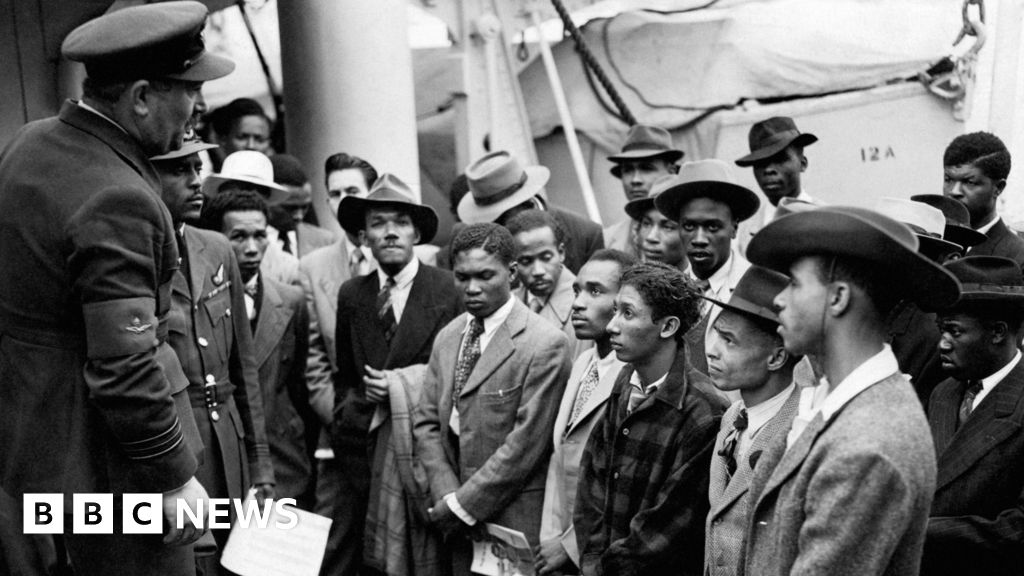
Windrush campaigners have expressed concern that the home secretary has yet to announce when she will implement a key recommendation from the government’s review.
On Thursday, Yvette Cooper announced an additional £1.5m of funding to help victims apply for compensation overseen by a Windrush Commissioner – but did not hand over recommended powers to a watchdog.
Campaigners told the BBC they were happy with Labour’s approach, but thought the new system lacked “teeth”.
A Home Office source described the changes as the “first set of announcements on Windrush since the election,” adding that the focus had been on priorities highlighted by campaigners and victims.
The Windrush Review’s report, published by Wendy Williams in 2020, made 30 recommendations which were all adopted by then home secretary Priti Patel.
But in January 2023, her successor Suella Braverman dropped three of them, including establishing a migrants’ commissioner role and giving the immigration watchdog – the Independent Chief Inspector of Borders and Immigration – the power to publish its own reports.
The watchdog currently has the power to carry out investigations, but the findings can only be published by the home secretary.
Following a legal challenge by Windrush victim Trevor Donald, a judge in June condemned Braverman’s actions as “conspicuously unfair”.
On Thursday, Cooper announced a Windrush commissioner would be appointed, but did not mention the Independent Chief Inspector of Borders and Immigration.
In February the then-chief inspector David Neal was sacked for leaking reports he had written that he claimed the Home Office was sitting on.
At the time, Cooper who was still in opposition said a “series of Conservative home secretaries have sought to bury uncomfortable truths revealed by the chief inspector”.
On Thursday, Cooper said she was “changing the government’s approach” to “ensure a scandal of this kind can never happen again and dignity can be restored to those so tragically affected”.
A Home Office source said this was the “first set of announcements on Windrush since the election” and said the focus had been on priorities raised by campaigners and victims.
They indicated that a new Windrush Unit, also announced today, could look at how to implement the final recommendation.
Following today’s announcement Cooper met representatives of Windrush campaign groups.
Some of those present welcomed the tone of the home secretary and said the new government appeared to “get” what it was that campaigners were looking for.
But they said there was no mention of when the Home Office would look at more powers for the chief inspector.
One said that the chief inspector needs to “have teeth” and be able to hold ministers to account “in a proper way”.
They said today’s meeting “marked the beginning” of relations between the new Labour government.
Campaigners said that Cooper had made it clear there were still parts of the Home Office that needed to change.
Another said the meeting was “uplifting” compared to ones held with Conservative ministers, but said the chief inspector “needs to be able to publish its findings” in order to prevent a similar scandal happening again.
The Windrush scandal emerged in 2018 when Commonwealth citizens, mostly from the Caribbean, were wrongly detained, deported or threatened with deportation despite having the right to live and work in the UK.
It was discovered that the Home Office had kept no records of those granted permission to stay and had not issued the paperwork they needed to confirm their status.
Many lost homes and jobs and were denied access to healthcare and benefits.
The government apologised in 2018, when it launched the Williams’ review.
Politics
Nigel Farage calls on Tory councillors to switch to Reform UK

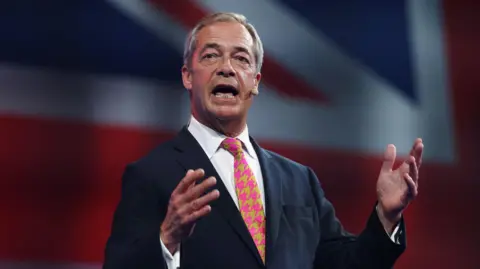 Reuters
ReutersNigel Farage has called on Conservative county councillors to defect to his Reform UK party.
In a letter obtained by the BBC, party leader Farage warns Tory councillors Reform’s “ground campaign capabilities will be formidable” by May’s local elections.
Speaking on X, Farage, who is also MP for Clacton in Essex, said he was writing to 1,352 Conservative county councillors as “a huge number of them genuinely agree with us and what we stand for”.
A Conservative party spokesman said: “Reform has delivered a Labour government. A vote for Reform this coming May is a vote for a Labour council.”
‘Councillors in talks with us’
In a letter sent to Essex Conservative county councillors, Farage says “our door is open should you consider standing for Reform UK”.
Farage told them since the general election “we’ve been assembling a national election winning machine at historic speed with hundreds of branches already established and over 90,000 active members ready to campaign”.
He has given Conservative councillors until 6 November to join and warns there will be a Reform candidate standing against them.
“Once somebody has been selected, we will not stand them down,” he wrote.
Farage said there were “other councillors in talks with us” after two Southend councillors defected from the Conservatives in September.
Conservative Kevin Bentley, leader of Essex County Council, said Farage’s letter “does smack of desperation”.
He said: “Some members have had a message from Reform and dismissed it.”
First Reform county councillor
A former Conservative councillor who was briefly a general election candidate has joined Reform UK.
Jaymey McIvor, who represents Ongar on Essex County Council, announced on X that he had joined Farage’s party.
The Conservatives said McIvor was expelled from the party on 9 October following a disciplinary hearing.
McIvor said he had already quit and that he had joined Reform UK as it “puts people and country first”.
He accused the Conservative Party of being “too weak to deal with its handful of toxic individuals” and they “tried to punish my ambition and vision”.
He said: “Reform has won the trust of the next generation. We are the future, we want our country back on track, rescuing it from the unpatriotic minority and put the patriotic majority back in the driver’s seat.”
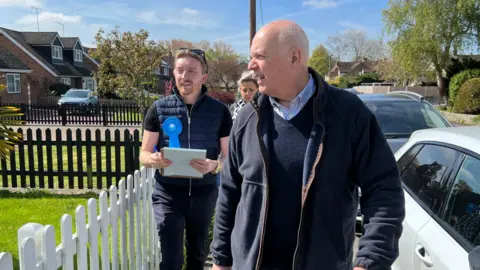
McIvor was selected to stand for the Conservatives in Hemel Hempstead in the general election. But hours from the deadline for nominations to be submitted he was dropped and suspended by the party pending an investigation.
A Conservative spokesperson said: “Mr McIvor was suspended by the party and removed from the candidates list in June.
“After a disciplinary hearing, he was expelled from the Conservative Party on 9 October.”
McIvor says he will “continue to serve my residents” as a Reform UK councillor on both Essex County Council and Epping Forest District Council.
Elections for Essex County Council are due to be held in May 2025.
Earlier this year, McIvor posted on X: “For every person that joins Reform UK , they become another campaigner for a Labour government, which would achieve the polar opposite to what they want to see changed.”
A spokesperson for Reform UK said: “We believe James McIvor has been the victim of vicious Tory infighting.
“We look forward to announcing many more councillors joining us in Essex from the Tory sinking ship.”
Politics
Rachel Reeves rejects calls for UK to act

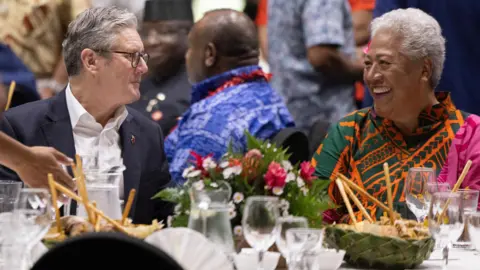 UK Government
UK GovernmentThe UK is “not going to be paying out” reparations for the transatlantic slave trade, Chancellor Rachel Reeves has told the BBC.
She said she understood why Commonwealth leaders would be making such demands but it was not something the UK government would commit to.
The legacy of slavery will be raised by the leaders at their summit in Samoa, which Prime Minister Sir Keir Starmer is attending.
Ahead of Friday’s meeting, he said he wanted to discuss current challenges, especially climate change, rather than issues of the past.
“That’s where I’m going to put my focus – rather than what will end up being very, very long endless discussions about reparations,” he said.
“Of course slavery is abhorrent to everybody; the trade and the practice, there’s no question about that. But I think from my point of view… I’d rather roll up my sleeves and work… on the current future-facing challenges.”
The chancellor reiterated that message in an interview with the BBC, saying: “We’re not going to be paying out the reparations that some countries are speaking about.
“I understand why they make those demands but that’s not something that this government is doing.”
Commonwealth leaders at the Samoa summit are expected to defy the UK and debate ways of securing reparations for historical slavery. At its height, Britain was the world’s biggest slave-trading nation.
Downing Street insists the issue is not on the agenda for the summit of 56 Commonwealth countries.
But diplomatic sources said officials were negotiating an agreement to conduct further research and begin a “meaningful conversation” about an issue which could potentially leave the UK owing billions of pounds in reparations.
Frederick Mitchell, foreign minister of the Bahamas, believes the UK could change its stance and he told BBC Radio 4’s Today programme: “Once you broach the subject it may take a while for people to come around but come around they will.”
Reparatory justice for slavery can come in many forms, including financial reparations, debt relief, an official apology, educational programmes, building museums, economic support, and public health assistance.
Mr Mitchell told the Commonwealth gathering: “It’s a simple matter – it can be done, one sentence, one line.”
He said to the BBC: “The word is apologise, that’s the word.”
Asked how much reparations should amount to, he said it was not just a matter of money but of “respect, acknowledging the past was a wrong that needs to be corrected”.
He said member countries “want the conversation to start” but “there appears to be even a reluctance to have the conversation”.
Earlier, a UK government spokesperson said: “Reparations are not on the agenda for the Commonwealth Heads of Government meeting. The government’s position has not changed – we do not pay reparations.
“We are focused on using the summit at [the Commonwealth Heads of Government Meeting] to discuss the shared opportunities which we can unlock across the Commonwealth – including securing more economic growth.”
It is understood the Downing Street position – that reparatory justice is not on the agenda – while technically correct, has angered some Caribbean ministers when it was obvious the issue would be discussed at the summit.
‘Sorrow and regret’
King Charles is in Samoa for a four-day visit and is due to formally open Friday’s summit.
On a visit to Kenya last year, the King expressed the “greatest sorrow and regret” over the “wrongdoings” of the colonial era, but stopped short of issuing an apology, which would have required the agreement of ministers.
Some non-Caribbean countries are not unsympathetic towards the British position and want the summit to focus more on existing challenges – such as climate change, which is adversely affecting many Commonwealth countries, about half of whom are small island states.
But Caribbean countries seem determined to keep pressing the issue.
All three candidates hoping to be elected this weekend as the next secretary general of the Commonwealth – Shirley Botchwey of Ghana, Joshua Setipa of Lesotho and Mamadou Tangara of Gambia – have made clear they support reparatory justice.
-

 Technology4 weeks ago
Technology4 weeks agoIs sharing your smartphone PIN part of a healthy relationship?
-

 Science & Environment1 month ago
Science & Environment1 month agoHow to unsnarl a tangle of threads, according to physics
-

 Science & Environment1 month ago
Science & Environment1 month agoHyperelastic gel is one of the stretchiest materials known to science
-

 Science & Environment1 month ago
Science & Environment1 month ago‘Running of the bulls’ festival crowds move like charged particles
-

 Science & Environment1 month ago
Science & Environment1 month agoMaxwell’s demon charges quantum batteries inside of a quantum computer
-

 Technology1 month ago
Technology1 month agoWould-be reality TV contestants ‘not looking real’
-

 Science & Environment4 weeks ago
Science & Environment4 weeks agoX-rays reveal half-billion-year-old insect ancestor
-

 Science & Environment1 month ago
Science & Environment1 month agoSunlight-trapping device can generate temperatures over 1000°C
-

 Technology4 weeks ago
Technology4 weeks agoUkraine is using AI to manage the removal of Russian landmines
-

 Science & Environment1 month ago
Science & Environment1 month agoLiquid crystals could improve quantum communication devices
-

 Science & Environment1 month ago
Science & Environment1 month agoQuantum ‘supersolid’ matter stirred using magnets
-

 TV3 weeks ago
TV3 weeks agoসারাদেশে দিনব্যাপী বৃষ্টির পূর্বাভাস; সমুদ্রবন্দরে ৩ নম্বর সংকেত | Weather Today | Jamuna TV
-

 News3 weeks ago
News3 weeks ago▶ Hamas Spent $1B on Tunnels Instead of Investing in a Future for Gaza’s People
-

 Science & Environment1 month ago
Science & Environment1 month agoA new kind of experiment at the Large Hadron Collider could unravel quantum reality
-

 Science & Environment1 month ago
Science & Environment1 month agoLaser helps turn an electron into a coil of mass and charge
-

 Womens Workouts1 month ago
Womens Workouts1 month ago3 Day Full Body Women’s Dumbbell Only Workout
-

 Technology3 weeks ago
Technology3 weeks agoSamsung Passkeys will work with Samsung’s smart home devices
-

 News3 weeks ago
News3 weeks agoMassive blasts in Beirut after renewed Israeli air strikes
-

 Business3 weeks ago
Business3 weeks agoWhen to tip and when not to tip
-

 Football3 weeks ago
Football3 weeks agoRangers & Celtic ready for first SWPL derby showdown
-

 MMA3 weeks ago
MMA3 weeks ago‘Uncrowned queen’ Kayla Harrison tastes blood, wants UFC title run
-

 Sport3 weeks ago
Sport3 weeks agoBoxing: World champion Nick Ball set for Liverpool homecoming against Ronny Rios
-

 News3 weeks ago
News3 weeks agoNavigating the News Void: Opportunities for Revitalization
-

 Technology4 weeks ago
Technology4 weeks agoMicrophone made of atom-thick graphene could be used in smartphones
-

 Sport3 weeks ago
Sport3 weeks agoMan City ask for Premier League season to be DELAYED as Pep Guardiola escalates fixture pile-up row
-

 Science & Environment1 month ago
Science & Environment1 month agoWhy this is a golden age for life to thrive across the universe
-

 Science & Environment1 month ago
Science & Environment1 month agoPhysicists have worked out how to melt any material
-
Business3 weeks ago
DoJ accuses Donald Trump of ‘private criminal effort’ to overturn 2020 election
-

 Sport3 weeks ago
Sport3 weeks agoWales fall to second loss of WXV against Italy
-

 MMA3 weeks ago
MMA3 weeks agoPereira vs. Rountree prediction: Champ chases legend status
-

 Science & Environment1 month ago
Science & Environment1 month agoQuantum forces used to automatically assemble tiny device
-

 Science & Environment1 month ago
Science & Environment1 month agoA slight curve helps rocks make the biggest splash
-

 Science & Environment1 month ago
Science & Environment1 month agoNerve fibres in the brain could generate quantum entanglement
-

 News1 month ago
News1 month ago▶️ Hamas in the West Bank: Rising Support and Deadly Attacks You Might Not Know About
-

 MMA3 weeks ago
MMA3 weeks agoJulianna Peña trashes Raquel Pennington’s behavior as champ
-

 MMA3 weeks ago
MMA3 weeks agoDana White’s Contender Series 74 recap, analysis, winner grades
-

 Technology3 weeks ago
Technology3 weeks agoMusk faces SEC questions over X takeover
-

 News3 weeks ago
News3 weeks ago‘Blacks for Trump’ and Pennsylvania progressives play for undecided voters
-

 Technology3 weeks ago
Technology3 weeks agoThis AI video generator can melt, crush, blow up, or turn anything into cake
-

 Sport3 weeks ago
Sport3 weeks agoSturm Graz: How Austrians ended Red Bull’s title dominance
-

 News3 weeks ago
News3 weeks agoFamily plans to honor hurricane victim using logs from fallen tree that killed him
-

 Sport3 weeks ago
Sport3 weeks agoAaron Ramsdale: Southampton goalkeeper left Arsenal for more game time
-

 Science & Environment1 month ago
Science & Environment1 month agoHow to wrap your mind around the real multiverse
-

 Science & Environment1 month ago
Science & Environment1 month agoNuclear fusion experiment overcomes two key operating hurdles
-

 Technology1 month ago
Technology1 month agoMeta has a major opportunity to win the AI hardware race
-

 Technology4 weeks ago
Technology4 weeks agoWhy Machines Learn: A clever primer makes sense of what makes AI possible
-

 News1 month ago
News1 month ago▶️ Media Bias: How They Spin Attack on Hezbollah and Ignore the Reality
-

 Science & Environment1 month ago
Science & Environment1 month agoITER: Is the world’s biggest fusion experiment dead after new delay to 2035?
-

 Technology4 weeks ago
Technology4 weeks agoRussia is building ground-based kamikaze robots out of old hoverboards
-

 Science & Environment1 month ago
Science & Environment1 month agoTime travel sci-fi novel is a rip-roaringly good thought experiment
-
Business3 weeks ago
Sterling slides after Bailey says BoE could be ‘a bit more aggressive’ on rates
-

 Technology3 weeks ago
Technology3 weeks agoMicrosoft just dropped Drasi, and it could change how we handle big data
-

 Football3 weeks ago
Football3 weeks agoWhy does Prince William support Aston Villa?
-

 Sport3 weeks ago
Sport3 weeks agoCoco Gauff stages superb comeback to reach China Open final
-

 Sport4 weeks ago
Sport4 weeks agoWorld’s sexiest referee Claudia Romani shows off incredible figure in animal print bikini on South Beach
-
Business3 weeks ago
Bank of England warns of ‘future stress’ from hedge fund bets against US Treasuries
-

 Business3 weeks ago
Business3 weeks agoChancellor Rachel Reeves says she needs to raise £20bn. How might she do it?
-

 Technology3 weeks ago
Technology3 weeks agoGmail gets redesigned summary cards with more data & features
-

 Sport3 weeks ago
Sport3 weeks agoChina Open: Carlos Alcaraz recovers to beat Jannik Sinner in dramatic final
-

 Technology3 weeks ago
Technology3 weeks agoTexas is suing TikTok for allegedly violating its new child privacy law
-

 Money3 weeks ago
Money3 weeks agoWetherspoons issues update on closures – see the full list of five still at risk and 26 gone for good
-

 Technology3 weeks ago
Technology3 weeks agoThe best budget robot vacuums for 2024
-

 MMA3 weeks ago
MMA3 weeks agoPereira vs. Rountree preview show live stream
-

 Technology3 weeks ago
Technology3 weeks agoThe best shows on Max (formerly HBO Max) right now
-

 Entertainment3 weeks ago
Entertainment3 weeks agoNew documentary explores actor Christopher Reeve’s life and legacy
-

 MMA3 weeks ago
MMA3 weeks agoAlex Pereira faces ‘trap game’ vs. Khalil Rountree
-

 News3 weeks ago
News3 weeks agoWoman who died of cancer ‘was misdiagnosed on phone call with GP’
-

 News3 weeks ago
News3 weeks agoGerman Car Company Declares Bankruptcy – 200 Employees Lose Their Jobs
-

 MMA3 weeks ago
MMA3 weeks ago‘I was fighting on automatic pilot’ at UFC 306
-

 MMA3 weeks ago
MMA3 weeks agoKetlen Vieira vs. Kayla Harrison pick, start time, odds: UFC 307
-

 Sport3 weeks ago
Sport3 weeks ago2024 ICC Women’s T20 World Cup: Pakistan beat Sri Lanka
-
News1 month ago
the pick of new debut fiction
-

 News1 month ago
News1 month agoOur millionaire neighbour blocks us from using public footpath & screams at us in street.. it’s like living in a WARZONE – WordupNews
-

 Technology3 weeks ago
Technology3 weeks agoEpic Games CEO Tim Sweeney renews blast at ‘gatekeeper’ platform owners
-

 News3 weeks ago
News3 weeks agoHull KR 10-8 Warrington Wolves – Robins reach first Super League Grand Final
-

 MMA3 weeks ago
MMA3 weeks agoUFC 307 preview show: Will Alex Pereira’s wild ride continue, or does Khalil Rountree shock the world?
-

 Business3 weeks ago
Business3 weeks agoStark difference in UK and Ireland’s budgets
-

 News3 weeks ago
News3 weeks agoBalancing India and China Is the Challenge for Sri Lanka’s Dissanayake
-

 News3 weeks ago
News3 weeks agoHeavy strikes shake Beirut as Israel expands Lebanon campaign
-

 TV3 weeks ago
TV3 weeks agoLove Island star sparks feud rumours as one Islander is missing from glam girls’ night
-

 Technology3 weeks ago
Technology3 weeks agoJ.B. Hunt and UP.Labs launch venture lab to build logistics startups
-

 TV3 weeks ago
TV3 weeks agoPhillip Schofield accidentally sets his camp on FIRE after using emergency radio to Channel 5 crew
-

 Technology3 weeks ago
Technology3 weeks agoOpenAI secured more billions, but there’s still capital left for other startups
-
Business3 weeks ago
Head of UK Competition Appeal Tribunal to step down after rebuke for serious misconduct
-
Business3 weeks ago
The search for Japan’s ‘lost’ art
-

 Science & Environment3 weeks ago
Science & Environment3 weeks agoMarkets watch for dangers of further escalation
-

 Football3 weeks ago
Football3 weeks agoSimo Valakari: New St Johnstone boss says Scotland special in his heart
-

 News3 weeks ago
News3 weeks agoHeartbreaking end to search as body of influencer, 27, found after yacht party shipwreck on ‘Devil’s Throat’ coastline
-

 Technology3 weeks ago
Technology3 weeks agoApple iPhone 16 Plus vs Samsung Galaxy S24+
-

 Technology3 weeks ago
Technology3 weeks agoPopular financial newsletter claims Roblox enables child sexual abuse
-

 Health & fitness3 weeks ago
Health & fitness3 weeks agoNHS surgeon who couldn’t find his scalpel cut patient’s chest open with the penknife he used to slice up his lunch
-

 Money3 weeks ago
Money3 weeks agoPub selling Britain’s ‘CHEAPEST’ pints for just £2.60 – but you’ll have to follow super-strict rules to get in
-

 Technology3 weeks ago
Technology3 weeks agoIf you’ve ever considered smart glasses, this Amazon deal is for you
-

 News3 weeks ago
News3 weeks agoLiverpool secure win over Bologna on a night that shows this format might work
-

 Technology3 weeks ago
Technology3 weeks agoAmazon’s Ring just doubled the price of its alarm monitoring service for grandfathered customers
-

 TV3 weeks ago
TV3 weeks agoMaayavi (මායාවී) | Episode 23 | 02nd October 2024 | Sirasa TV
-
Politics3 weeks ago
Rosie Duffield’s savage departure raises difficult questions for Keir Starmer. He’d be foolish to ignore them | Gaby Hinsliff
-
Business3 weeks ago
Can liberals be trusted with liberalism?
-

 Technology3 weeks ago
Technology3 weeks agoA very underrated horror movie sequel is streaming on Max
-

 Science & Environment1 month ago
Science & Environment1 month agoPhysicists are grappling with their own reproducibility crisis


You must be logged in to post a comment Login